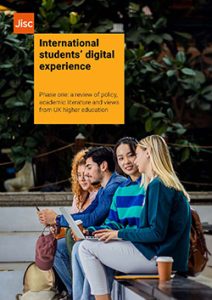We are invigorating this blog with the new research into international students’ digital experience.
Since launching our phase 1 report investigating the digital experience of international students at THE Digital Universities event in April, we’ve been busy engaging the sector in its findings. We have been grateful for further opportunities to speak at events such as: UCISA’s Spotlight on Digital Capabilities, UUK’s Enhancing the Student Experience conference, the Westminster HE forum on the future of international students in the UK, the Change Agents Network conference, and the EUNIS international congress in Spain.
Doing so has enabled us to also garner significant interest in the second phase of our research, which has seen us consult directly with international students studying in the UK. We are hugely grateful for the support of our 14 partner universities for running a cross-institutional survey, nine of whom have also kindly promoted engagement in, and hosted, student focus groups (with one hosting separate focus groups in their home and London campuses). The findings from this research are due to be published in Autumn 2023.
In the meantime, we have established a working group of over 50 members that aims to build community around this work with membership comprising representation from our partner institutions, as well as sector bodies whose remits support international students in higher education. Our first two meetings have already helped to facilitate an exchange of experience in working with international students and have prompted rich discussions on the digital experiences of international students, in particular. We thought we’d share some insights from the group. In this first blog post, we share some of the group’s responses to the following question:
What issues, if any, are you seeing or feeling curious about with respect to international students generally and, more specifically, in the way they use digital and interact with learning?
Individuals participating in the working group provided the following responses:
Accessing devices and connectivity
“Not all international students have their own device. Even though there are hundreds of loan laptops, they quickly disappear within the first week of the semester.”
“We found several international students have declared a disability to staff but didn’t officially declare that before, mainly because they assumed it would cause a detrimental impact on admission decisions. It then makes it a little difficult providing resources that are tailored to their needs.”
“Something we are picking up from the Jisc survey is the issue international students report with struggling to access good wifi away from the university. This means that they’re using mobile devices and 4G much more to access university resources. We had picked up on issues with a lack of laptops and have been offering more loan laptops but are now talking about providing 4G dongles too.”
“International students may not have access to the internet in their accommodation or have mobile data packages.”
“Prior experience can be problematic due to infrastructure issues in home nations (highlighted during the pandemic when students were unable to digitally submit work during lockdowns). Some students may not have electricity or internet access and this will impact their use of digital technologies prior to coming to the UK.”
Cultural differences
“[We are finding that…] the familiarity with certain technologies (and the intensity of use) is different across different cultures. Large numbers of students who may not have the kit, may not be using Microsoft or ‘standard’ software, or have the skills and experience that we may expect.”
“Pedagogic interactions with UK learning and teaching are very different between international students. We have observed very different interactions between students from different backgrounds and countries and that student engagement is very different between cultures.”
“Many international students have additional complexity beyond the university. For example, working outside of classes, caring for family etc. This can cause a lack of engagement and attendance.”
Skills support
“Where students are able to afford their own device, they still need support with academic integrity, sources, referencing and digital skills.”
Managing expectations
“Better comms and promotion of resources are needed to make it clear to incoming international students (and prospectives and offer-holders) how teaching here will work so that they are more aware and better prepared when they start.”
“If students are choosing to come to the UK for a UK higher education experience, how do students then perceive this when they find themselves on programmes that have mostly recruited students of the same nationality?”
These comments helped seed discussions amongst the working group, and have been fed back into the wider project data collection exercise. In the next post, we will be sharing examples from the group of additional support materials or teaching that institutions provide explicitly for international students.
Staying in touch
If you would like to stay in touch with our work, please ensure you’ve joined the ISDX mailing list: https://www.jisc.ac.uk/forms/stay-informed-of-our-research-into-international-students-digital-experience


One reply on “Sector engagement in international students’ digital experience”
[…] on our previous blog post, Tabetha Newman, our consultant researcher, has summarised some interesting reports and articles […]